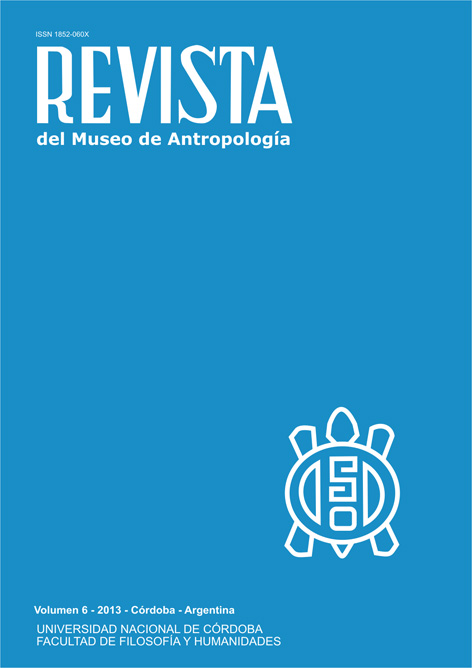‘¿You don´t say hello anymore because you are in debt?’ Neighbors, morality and politics in Cooperative Las Cuatro Banderas (Córdoba city)
DOI:
https://doi.org/10.31048/1852.4826.v6.n1.5510Keywords:
morality, neighbors, cooperative, land, politic practicesAbstract
The moral regime that manage and regulate the life of the individuals have been subject of analysis of Anthropology, as well as the diverse conflicts, antagonisms, and negotiations that these normative systems provoke in certain social groups. Therefore, the need to investigate the social processes that grant ethical content to certain concepts and practices requires of a study that, from an ethnographical approach, would explain how some specific judgments are made and challenged in each single context. This article exposes the different ways in which the neighbors of the Cooperative “Las Cuatro Banderas” are categorized by the members of the executive committee, according to the payment (or nonpayment) of the land, and the consequences carried to other dimensions of their social life as a result of such categories. At the same time, the speeches and practices of those who preside the committee, are also addressed by those outside the entity, who judge the forms - individual or collective - of doing politics. Understanding this will allow us to see how these moral distinctions are set in motion within a liminality process when facing the possible dissolution of the cooperative, once finished the individual public deed of the land within a social housing state program.Downloads
References
Bailey, F. G. 1971. Gifts and Poison. Gifts and Poison: The Poitics of Reputation. Brasil: Blackwell, Oxford, pp.1-25
Balbi, F. A. 1997. Interdependencia, memoria institucional y valores morales: fundamentos sociales de la moralidad en una cooperativa de pescadores entrerrianos. Avá. Revista de Antropología Social, Programa de Postgrado en Antropología Social, UNAM, Número 2: pp. 95-111.
Balbi, F. A. 2007. De leales, desleales y traidores. Valor moral y concepción de política en el peronismo. Buenos Aires: Antropofagia.
Bermúdez, N. y Previtali, M. 2013. Merodear la ciudad. Miradas antropológicas sobre espacio urbano e ‘inseguridad’ en Córdoba. Córdoba: Editorial de la Facultad de Filosofía y Humanidades - UNC (en prensa).
Boivin, M., Heredia, B., Rosato, A. 2010. Política, instituciones y gobierno: abordajes y perspectivas antropológicas sobre el hacer política. Introducción. Buenos Aires: Antropofagia.
Carenzo, S. y Wilkis, A. 2009. Lidiar con dones, lidiar con mercancías. Etnografías de transacciones económicas y morales. Revista Apuntes de Investigación 14: 161-193.
Frederic, S. 2004. El ocaso del “villero” y la profesionalización de los “políticos”: sobre el problema moral de la política en el Gran Buenos Aires. Etnografías Contemporáneas, Nro.1, Año 1, pp.: 98-125.
Gravano, A. 2003. Antropología de lo barrial. Estudios sobre producción simbólica de la vida urbana. Buenos Aires: Espacio Editorial.
Kuschnir, K. 2007. Antroplogia da política. Río de Janeiro: Editorial Zahar.
Malinowski, B. 1995. El mito en la psicología primitiva. Estudios de psicología primitiva. Barcelona. Altaya, Grandes Obras del Pensamiento. pp. 17 a 81.
Marques, A. C. 2002. Intrigas e questoes. Vingança de família e tramas sociais no sertão de Perambuco. Rio de Janeiro: Relumen Dumará, Coleçao Antropologia da Política.
Puex, N. 2003. Las formas de violencia en tiempos de crisis. Una villa miseria del conurbano bonaerense. Heridas Urbanas. Violencia delictiva y transformaciones sociales en los noventa. Buenos Aires: Editorial de las Ciencias.
Pitt Rivers, J. 1994. Un pueblo de la sierra: Grazalema. Madrid: Alianza Editorial
Quirós, J. 2006. Cruzando la Sarmiento. Una etnografía sobre piqueteros en la trama social del sur del Gran Buenos Aires. Buenos Aires: Antropofagia
Rosato, A y Balbi, F. A. (Eds.). 2003. Representaciones sociales y procesos políticos. Estudios desde la Antropología Social. Buenos Aires: Centro de Antropología Social, Instituto de Desarrollo Económico y Social & Editorial Antropofagia.
Turner, V. 1994. Entre lo uno y lo otro: el período liminar en los “rites de passage”. La selva de los símbolos. México: Siglo XXI.
Vommaro, G. y Quirós, J. 2011. ‘Usted vino por su propia decisión’. Repensar el clientelismo en clave etnográfica. Desacatos. Nro 36. México. Centro de Investigaciones y Estudios Superiores en Antropología Social. pp: 65-84
Wilkis, A. 2008. Don, dinero y moral en el análisis de un circuito filantrópico. Documentos de Investigación Social. Nro 1. IDAES-UNSAM. Disponible en http://www.idaes.edu.ar/sitio/publicaciones/DocIS_1_ArielWilkis.pdf (Última consulta 20/05/2013)
Zelizer, V. 2011. El significado social del dinero. Buenos Aires: Fondo de Cultura Económica.
Downloads
Published
Issue
Section
License
Those authors who have publications with this Journalaccept the following terms:
a. Authors will retain their copyrights and guarantee the journal the right of first publication of their work, which will be simultaneously subject to the Creative Commons Attribution License (Licencia de reconocimiento de Creative Commons) that allows third parties to share the work as long as its author and his first publication in this journal.
b. Authors may adopt other non-exclusive licensing agreements for the distribution of the version of the published work (eg, deposit it in an institutional electronic file or publish it in a monographic volume) provided that the initial publication in this journal is indicated.
c. Authors are allowed and recommended to disseminate their work on the Internet (eg in institutional telematic archives or on their website) before and during the submission process, which can lead to interesting exchanges and increase citations of the published work. (See The Effect of Open Access - El efecto del acceso abierto)












